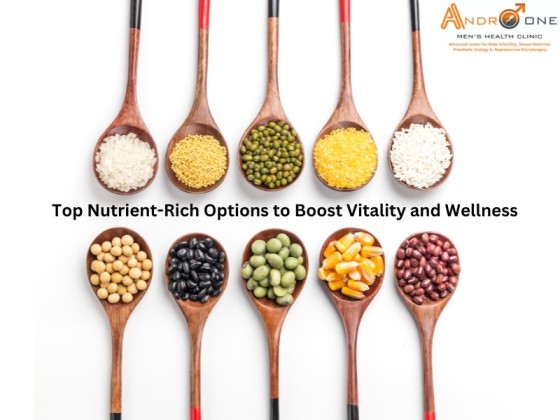Best Foods for Men’s Health: Top Nutrient-Rich Options to Boost Vitality and Wellness
Maintaining a healthy diet is crucial for men’s overall well-being and vitality. Proper nutrition supports various aspects of health, from heart function and muscle maintenance to energy levels and prostate health. This guide highlights key foods that can enhance men’s health, providing essential nutrients and benefits. The Importance of a Balanced Diet for Men’s Health A balanced diet plays a significant role in maintaining and improving men’s health. Consuming a variety of nutrient-rich foods ensures that your body receives the essential vitamins, minerals, and other nutrients required for optimal function. Proper nutrition impacts several key areas: – Heart Health: Nutrient-dense foods can help manage cholesterol levels, reduce inflammation, and support overall cardiovascular health. – Muscle Mass: Adequate protein intake is vital for muscle growth and repair, especially important for active men or those engaging in strength training. – Prostate Health: Certain nutrients can help maintain prostate health and reduce the risk of prostate-related issues. – Energy Levels: A balanced intake of carbohydrates, proteins, and fats ensures sustained energy throughout the day. Top Foods to Include in a Healthy Diet for Men Lean Proteins – Chicken and Turkey: These lean meats are excellent sources of protein, essential for muscle growth, repair, and overall bodily functions. They are lower in fat compared to red meats, making them a heart-healthy choice. – Fish (Salmon, Tuna, Mackerel): Rich in omega-3 fatty acids, these fish contribute to heart health by reducing inflammation and lowering triglyceride levels. They also support brain function and overall vitality. – Legumes (Beans, Lentils): Beans and lentils provide plant-based protein and are high in fiber, which aids in digestion and helps maintain healthy blood sugar levels. Healthy Fats – Avocados: Packed with monounsaturated fats, avocados promote heart health and help absorb fat-soluble vitamins. They also contain potassium, which supports cardiovascular function. – Nuts and Seeds (Almonds, Chia Seeds, Flaxseeds): These are excellent sources of healthy fats, fiber, and essential nutrients like vitamin E and magnesium. They contribute to heart health and help regulate blood sugar levels. – Olive Oil: Extra virgin olive oil is a staple in the Mediterranean diet and is known for its anti-inflammatory properties and benefits to heart health. It’s a versatile cooking oil that can enhance flavor while supporting overall wellness. Complex Carbohydrates – Whole Grains (Oats, Quinoa, Brown Rice): These grains are rich in fiber, which aids in digestion and helps maintain steady energy levels. They also provide essential vitamins and minerals that support overall health. – Sweet Potatoes: Sweet potatoes are nutrient-dense, offering a wealth of vitamins A and C, potassium, and fiber. They are a great alternative to refined carbohydrates and provide long-lasting energy. Fruits and Vegetables – Berries (Blueberries, Strawberries, Raspberries): High in antioxidants, berries help combat oxidative stress and inflammation. They support heart health, cognitive function, and immune system performance. – Leafy Greens (Spinach, Kale, Broccoli): These vegetables are packed with vitamins, minerals, and fiber. They support bone health, immune function, and overall well-being. – Citrus Fruits (Oranges, Grapefruit): Citrus fruits are high in vitamin C, which boosts the immune system, supports skin health, and aids in the absorption of iron. Dairy and Alternatives – Greek Yogurt: Rich in protein and probiotics, Greek yogurt supports muscle recovery, digestion, and gut health. It’s a versatile ingredient that can be used in various recipes or as a standalone snack. – Low-Fat Milk or Plant-Based Alternatives (Almond, Soy, Oat Milk): These options provide calcium and vitamin D, essential for bone health. Plant-based milks offer alternatives for those who are lactose intolerant or prefer non-dairy options. Foods Rich in Zinc and Selenium – Oysters: Oysters are one of the best sources of zinc, a mineral essential for testosterone production, immune function, and overall health. – Brazil Nuts: These nuts are an excellent source of selenium, which plays a crucial role in thyroid function and offers antioxidant protection. Foods to Limit or Avoid for Optimal Health Processed and Red Meats Processed and red meats can negatively impact heart health and increase the risk of certain cancers. They are often high in unhealthy fats and sodium, which can contribute to cardiovascular issues and other health problems. Sugary Foods and Beverages Consuming high amounts of sugar can lead to weight gain, energy crashes, and an increased risk of diabetes. Limiting sugary foods and beverages helps maintain stable energy levels and supports overall health. High-Sodium Foods Excessive sodium intake can elevate blood pressure and strain the cardiovascular system. Reducing high-sodium foods, such as processed snacks and canned soups, helps manage blood pressure and promotes heart health. Alcohol Consumption Moderate alcohol consumption is key to avoiding negative health effects. Excessive drinking can lead to liver damage, impaired cognitive function, and other health issues. Limiting alcohol intake supports overall wellness and prevents potential health risks. Tips for Incorporating Healthy Foods into Your Diet – Meal Planning and Preparation: Plan your meals to include a variety of nutrient-rich foods. Prepare meals in advance to ensure you have healthy options readily available. – Quick and Nutritious Snacks: Keep healthy snacks, such as nuts, fruits, and yogurt, on hand for quick energy boosts and to avoid unhealthy temptations. – Variety and Balance: Ensure your diet includes a wide range of foods to provide all essential nutrients. Balance your meals with appropriate portions of proteins, fats, and carbohydrates to support overall health. Conclusion Incorporating nutrient-rich foods into your diet is essential for maintaining and improving men’s health. By focusing on lean proteins, healthy fats, complex carbohydrates, and a variety of fruits and vegetables, you can support heart health, muscle growth, energy levels, and overall wellness. Limiting processed foods, sugary items, and excessive sodium or alcohol further enhances your health and well-being. Embrace these dietary practices to boost vitality and enjoy a healthier, more fulfilling life.

